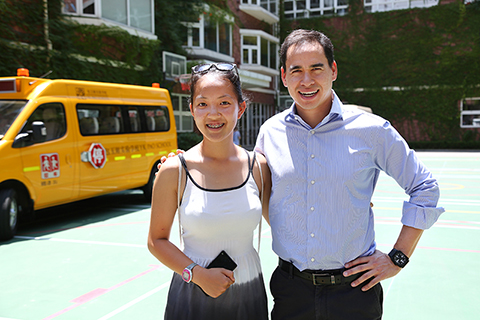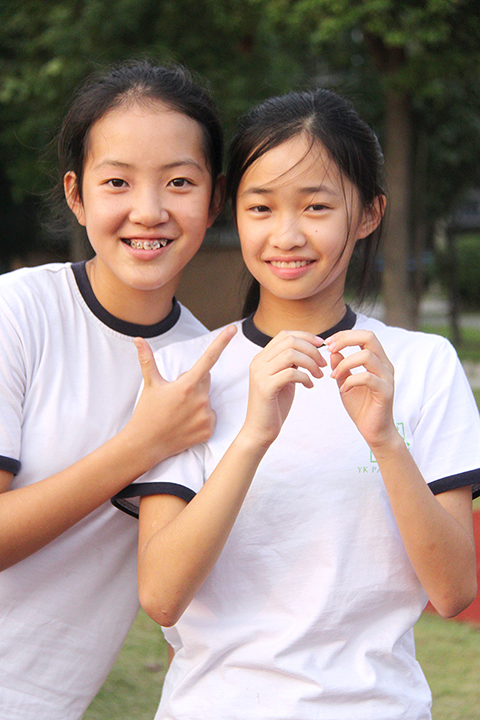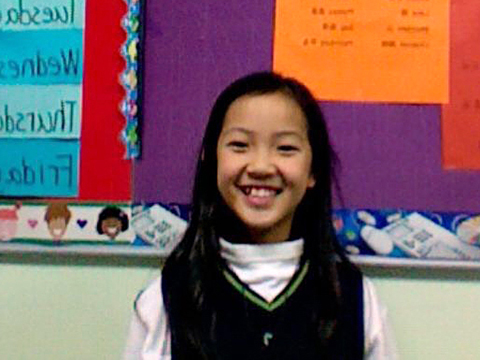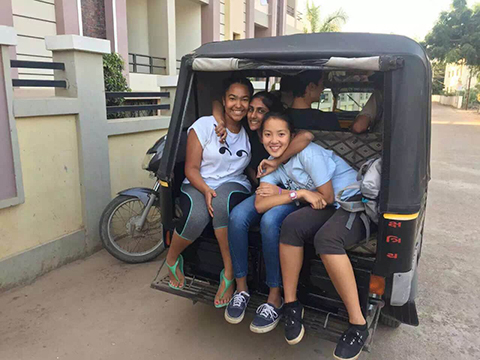
The first Pao School alumni member we are going to introduce is Jenny Chan, who studied at Pao School from 2008 to 2013. During her years at the school, Jenny was a diligent student and active member of the Pao community.
Her classmates and teachers describe her as an outgoing girl with a radiant personality - a person quick to take the initiative and sincere in her passions.
Jenny’s History teacher Mr. Zigler said: ‘Jenny was always a hard working and productive member of the class. She had a lot to say that not only demonstrated knowledge, but also helped to move class discussion forward. I hope that students can end their ignorance or confusion through questions and Jenny seemed to take that to heart’.

Jenny’s acumen allowed her to be a leader in many ways in the Pao community; such leadership qualities are an important advantage during the university application process. In addition to her strong academic performance, she was a member of Pao School’s swimming and Ultimate Frisbee teams. Further, she competed in the Ultimate Frisbee World Championship in 2014 and 2016.

Now a Year-11student in the first year of IB, Jenny transferred from a boarding school in England to Mahindra United World College in India. For many people, the decision to transfer to India seems unusual. Why not transfer to a school in the United States? What led Jenny to make this decision? In the following paragraphs, we can see key aspects of Jenny’s personality that impacted her decision.
'Ultimate Frisbee is the best thing that happened to me'.
Anyone who knows Jenny is aware of her passion for Ultimate Frisbee (commonly known as Ultimate). She began playing the sport in Year 7 when it was first introduced to Pao School. Ultimate is an exciting, non-contact team sport that originated in the US. In addition to physical prowess, the sport requires strong teamwork skills.
Jenny was the leader of a group of big Ultimate fans at Pao School. They would gather regularly to play. In total, they would play for up to 2 ½ hours a day. For Jenny, playing Ultimate was a good way to relieve academic stress. It provided her with a healthy way to take her mind off schoolwork.
Most importantly, thanks to Ultimate ‘I gained a family’, Jenny said. “You work together and compete against each other on the field, while off the field, you spend time together building these bonds’.
However, some people told her if she played Ultimate less often, she could get better grades. To those people, Jenny responded: ‘But life is not always about getting straight A’s or getting a 45 in IB; it’s about doing things that make you happy’.
'I want to be myself and not follow what others do. Eventually, we all must create our own path instead of following someone else’s.'
A fiercely independent thinker, Jenny has never been one to compromise her ideals to fit in with mainstream opinion. For instance, she is passionate about mathematics and was leaning toward Advanced Math for her IB course. As she was preparing to make this decision, her classmates told her it would be impossible to get a 7 (the highest score) and urged her to take the standard-level course instead.
Yet for Jenny, the most important thing was to follow her passion for math, which she believed would be better achieved in the advanced course. She wasn’t interested in taking the safe route. She had yet to decide on which university she wanted to attend, or the major she would choose to pursue. What she knew for certain was that her objective was not a 45 in IB or admission to an Ivy League school. She instead wanted to do what she enjoyed. To achieve personal success, you need to be yourself, not attempt to be what others expect of you.
'Pao school made me stronger'.
Six years of study at Pao School had a major impact on Jenny’s life. She has many fond memories of her and classmates’ time at the school: time spent studying, working, playing and achieving together. These are things Pao School alumni will never forget. Pao School is where we all came together. The lifelong friendships we have forged with our friends and teachers will never be broken.
After leaving Pao School, Jenny still kept in touch with her friends whom she had known for six years. Visiting the Primary campus is a must for her whenever she visits Shanghai. ‘People do come and go in life, but these friends I have made in the six years are people I know will be my friends forever’, she said.
By living as a boarder in Songjiang, Jenny learned to be independent and make more informed decisions. Pao boarding life provides students with the chance to develop their unique personality traits and experience many different things. Jenny said: “Without Pao School, I never would have been able to step so far out of my comfort zone and do something different’.

In 2013, Jenny chose to leave the world she had known for a long time and to seek new challenges. She moved to England to attend boarding school for two years, and then eventually decided to study in India. ‘Two years in England were fairly easy for me’, she said. ‘I was in a boarding school where every single thing was well planned and organised by the school. Once again, I felt like I was no longer challenging myself and decided to apply to UWC’.
‘The most amazing three months of my life'.
UWC, known as United World Colleges, is a self-described ‘education movement’ comprising 16 international schools and colleges, national committees in more than 150 countries, and a series of short educational programmes. ‘UWC is different from many other schools; it empowers students’, Jenny said. “Students run almost all activities on campus, and are highly motivated to do great things for the world’.
Jenny was eager to study at UWC India, but thought her chances of acceptance were low because of the competitive application process. Ultimately, she prevailed, and was accepted to the programme. Her experience, meanwhile, was overwhelmingly positive. Students both local and international made her feel welcome. ‘You feel like you are a small part of this massive community at UWC,’ she said, adding: ‘Our aspirations both define us individually and unite us in a common cause’.
The main reason Jenny sought to study at UWC India was to explore whether India in reality matched the negative descriptions of the country on social media channels. Yet many people tried to dissuade her from studying in India. They said, ‘India is dangerous, chaotic and racist. As a girl, you should definitely not go there’.
Jenny felt it was important to challenge these stereotypes and prejudices about Indian society. She refused to listen to those who held these views, and set off to India determined to learn as much as possible about the country in the three months she would spend there.
‘Stereotypes should be disregarded and no judgment should be placed before making an effort to understand something’, Jenny said. While she lived in something of a campus bubble, there were still many opportunities to experience India authentically. For instance, she and her classmates could do a homestay in a local village, learn Hindi, or travel around the country on ‘India Experience Week.
Jenny was especially enthusiastic about the people she met in India, such as her roommates and teachers. The people helped define the experience for her, she said, adding: ‘You shouldn’t criticise India if you’ve never been to the country. It’s an amazing place and I love it here.’
Jenny’s story is inspiring. It teaches us to be persistent, to think positively, to step outside of our comfort zone and focus on results. We shouldn’t be too discouraged by setbacks, which are a normal part of life. What’s much more tragic is giving up the pursuit of something we love to take a safer path; that’s the type of decision that leads to big regrets later down the line. We end up living the life others expect of us, instead of the one we want to lead for ourselves. Perhaps most important of all, from Jenny we can learn to follow our dreams.
Jenny’s teaching experience in Ghana (October 2015)
I went to Ghana in October 2015 as a volunteer. I helped fund raise myself for the trip, which included a total of 16 students (including me) and two teachers. We were based in a small village a four-hour drive from the capital, where our partner school is located.
During our trip, we were able to visit a refugee camp on the outskirts of the village we stayed in, where there are around 3000 refugees from the neighboring country Ivory Coast.
We all have heard news about the refugee crisis in Europe, and how countries’ borders in Europe were closed to limit the amount of free movement within the EU. However, actually visiting a refugee camp, seeing how people live in it, and interacting with the refugees changed my perspective on the world a great deal.
Whenever I read the news, there are headlines regarding the ‘refugee crisis’ or ‘migrant crisis’. But should we actually label these people as refugees? I think social media plays a role in this. Let me give an example: A family is travelling around Europe by train, and will pass through France, Belgium and Germany. The family posts this information on social media. 9 out of 10 people who learn about the trip would write posts advising the family to be careful, to watch out for dangerous refugees in the train stations.
I strongly disagree with this type of thinking. Refugees are humans just like the rest of us. They have ideas, interests, passions and most importantly, dreams. However their ability to follow their dreams is compromised by political instability in their countries. They are then called ‘refugees’.
This is another reason why I applied to UWC. UWC aims to accept more refugees as students, provide them with full scholarships and allow them to achieve their dreams.
Student Reporter: Diana (Y10)